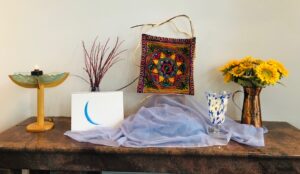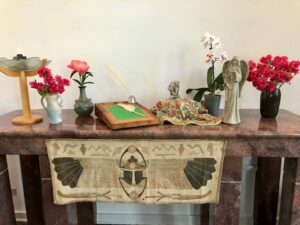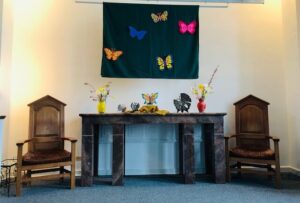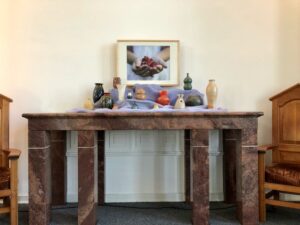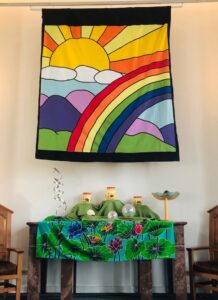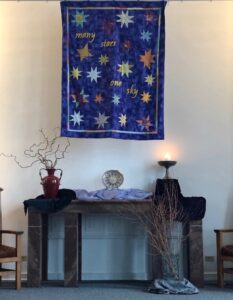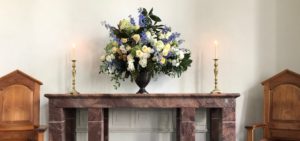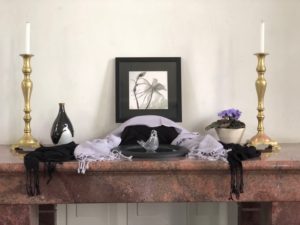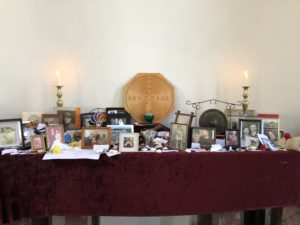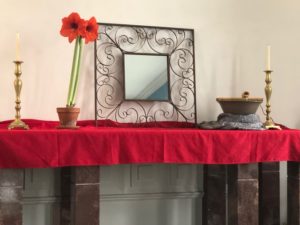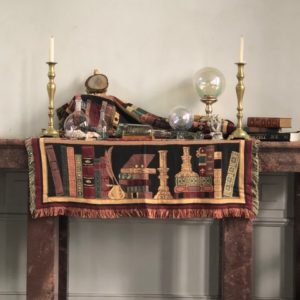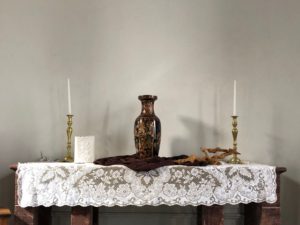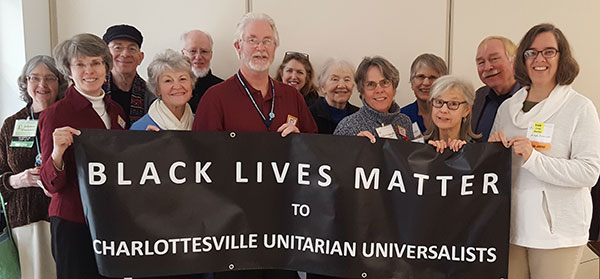
As we move toward the gathering storm that is the “Unite the Right” gathering of alt-right white nationalists in our city, I want to share with you some Charlottesville history, and some of our own history as a congregation.
On July 12, 1898, a man was lynched … here in Charlottesville. Accused of raping a white woman, John Henry James was seized by a mob of 150 people from a C&O train transporting him to the Charlottesville jail. He was then hung from a tree at Wood’s Crossing near Ivy Depot and shot 40 times. According to a front-page article of the Daily Progress, “the people of Charlottesville heartily approve[d] the lynching.”
In April of 1917, two African American men — Robert Jones and “Ham” Cosby — were indicted for, and had confessed to, the murder of a former Police Officer named Meredith A. Thomas. They were set to be tried on the 17th, but “a mob of hundreds” made their way to the jail, determined to take justice into their own hands and lynch the two. As they came down High Street they found their way blocked by local police and the Monticello Guard — “hundreds … at every corner in all directions from the jail.” When the mob refused to disburse, Mayor E. G. Haden, and Judge Archie D. Dabney were called for, and they “marched through the crowd for quite a while, exhorting all to preserve the peace and disperse to their home,” which they eventually did. The jail remained guarded throughout the night. [All of this from a story in the Daily Progress on April 17, 1917.]
In 1956, in response to the Supreme Court’s ruling mandating the integration of public schools, U.S. Senator Harry F. Byrd, Sr. called for what has come to be known as “massive resistance.” Several school districts in the South — Charlottesville among them — essentially closed their schools rather than see them integrated. Many area congregations opened their buildings to provide an alternative space for (white) children to continue to receive education.
In 1976, Molly Michie, Ann Spurgin, and Gwyneth Mooney, all members of this congregation, founded the Unitarian Cooperative Preschool (now known as the Molly Michie Preschool). It was the first parent cooperative preschool in the city and, more germane to this story, it was intentionally created to be multi-racial. The first integrated preschool in Charlottesville was not only housed in our building, it was envisioned and created by members of our congregation.
In 1956, when area churches were enabling the “massive resistance” strategy by making themselves available to continue the education of white children, our congregation refused to do so. (As you can imagine, this made us stand out, much as our marriage equality and black lives matter signs do today.)
In the 1950s there was no public facility in Charlottesville that would allow for integrated meetings … except for the Unitarian Church. We opened our doors to the local chapter of the Council on Human Relations — an integrated group that “that worked to foster communication and improve relations between blacks and whites. It worked through a state-wide organization and established local groups to support educational programs, school desegregation, fair employment practices, and other issues of the day.” Because of this, and no doubt also because of our refusal to participate in “massive resistance,” on August 13, 1956, representatives of the Seaboard White Citizens’ Council came to Charlottesville and burned a cross on our church’s grounds.
There are a myriad of other stories that could be told — some that reveal more details of an even more disturbing picture of race relations in Charlottesville, and some that don’t paint us in such a heroic light. The point, though, is that our city’s full history does not support the notion that (mostly white) people often have of Charlottesville as an idyllic oasis, removed from the problems that pervade the rest of the Commonwealth, specifically, and the South, generally. Long before Jason Kessler gathered a group of torch wielding white supremacists in, then, Lee Park, or the KKK rallied in Emancipation Park, or representatives of the “new” white nationalists come to town, race has been a painful issue here. This is important for us — and by “us” here I mostly mean people like me who identify as or are identified as white — to remember. This may be new to “us,” but this is not new, and to repeatedly voice our shock and surprise at it today is to further hide the realty of the experiences of black and brown people here.
It is also not “new” for us — those of us who claim as our spiritual home this outpost of Unitarian Universalism in the shadow of Monticello — to take strong, even sometimes courageous, positions in support of our values and in opposition to injustice. Our faith compelled us to do so in the past; it is compels us to do no less today.
It would be nice if there were some neat, clear-cut, outline, or program, of events on August 12th. There just isn’t, and, honestly, can’t be — the situation is too complex and, not to put too fine a point on it — chaotic. Things are changing both constantly and quickly, and it is hard to keep up (even for those who are planning things). I can recommend that we — as a congregation and as individuals — follow the leadership of the Charlottesville Clergy Collective. (They have a page dedicated to information about the 12th.) There is also our own website, Act Now Charlottesville, which is regularly updated to include all sorts of racial justice related events and activities.
Our Universalist ancestor, the Rev. Olympia Brown, is remembered as saying:
“Dear Friends, stand by this faith. Work for it and sacrifice for it. There is nothing in all the world so important to you as to be loyal to this faith which has placed before you the loftiest ideals, which has comforted you in sorrow, strengthened you for noble duty, and made the world beautiful for you. Do not demand immediate results but rejoice that you are worthy to be entrusted with this great message and that you are strong enough to work for a great true principle without counting the cost. Go on finding ever new applications of these truths and new enjoyments in their contemplation.”
That’s actually the theme of the service this Sunday, the call of our faith to “work for it and sacrifice for it.” See you on Sunday!
Pax tecum,
RevWik

